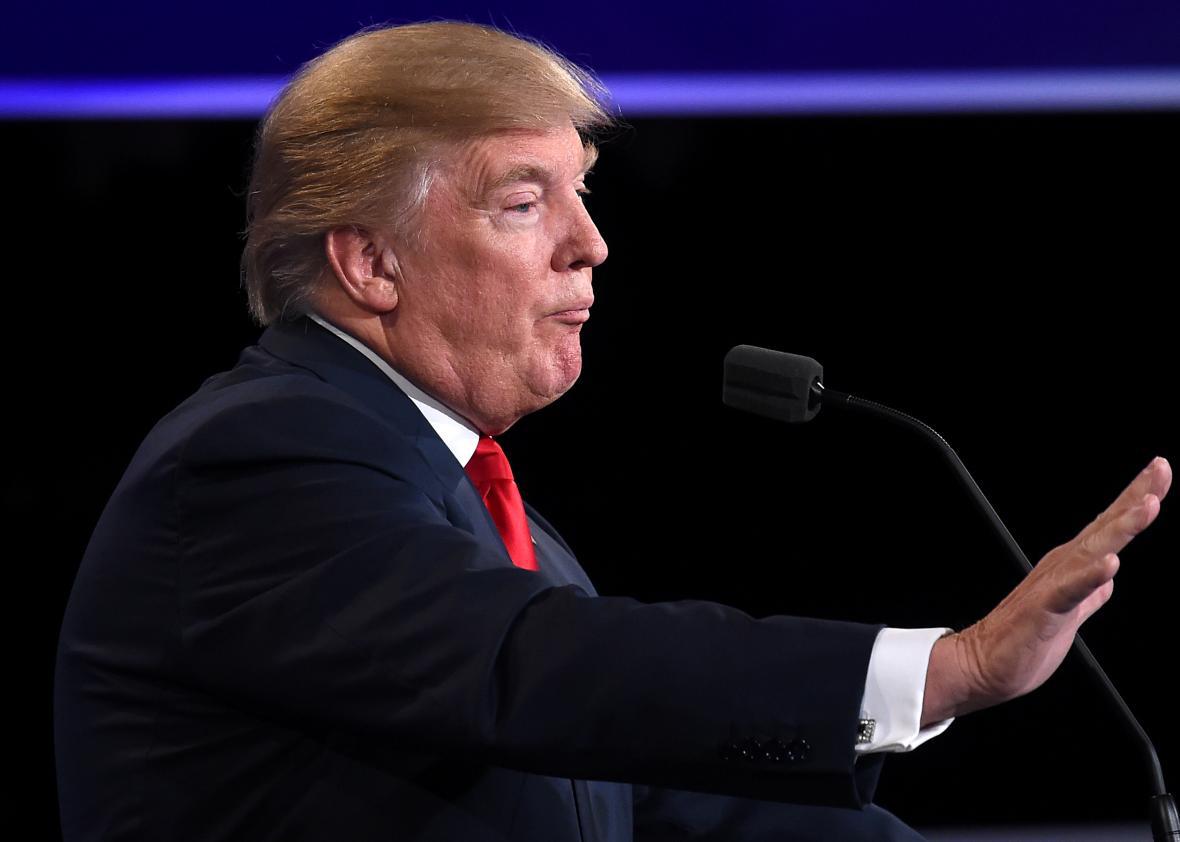Donald Trump has built a reputation as a lady-insulting, stamina-touting, sexually harassing, he-man woman-hating big-swinging dick of a presidential candidate. This image is what made a Politico headline from Wednesday, boldly declaring that “Donald Trump Talks Like a Woman,” so intriguing. Who wouldn’t click that? In the piece, Julie Sedivy presents some compelling academic research that compares Trump’s speaking style with other politicians and finds it surprisingly feminine. Linguistic analysis reveals that Trump uses tentative language, emotion-laden words, fewer long words, and fewer prepositions and articles, all characteristics that are strongly associated with women, a category of people Trump frequently dismisses and degrades.
In a chart based on the research of Jennifer Jones, a doctoral candidate at the University of California–Irvine, Trump appears as a “stunning outlier”: His language registers as more feminine than any of the 34 other politicians Jones studied, including Ben Carson, Chris Christie, and Trump’s other Republican primary opponents; former presidents George W. Bush and Barack Obama; and even actual women like Hillary Clinton, Geraldine Ferraro, and Michele Bachmann. According to the piece, these results aren’t just based on hunches or stereotypes but on statistical differences between the ways man and women talk as established by language researchers.
Then why does it feel like this argument wouldn’t pass most people’s gut checks? That Trump is a linguistic outlier has been discussed at length, with various experts and outlets weighing in and trying to nail down what makes his speaking style so different from what we’re used to. (Politico itself even previously concluded “Donald Trump Talks Like a Third Grader.”) The way he talks is different, for sure, with all kinds of repetition and odd syntax that routinely frustrates transcribers. And it stands to reason that this style is what some of his supporters like about him. Politico points out that “[r]esearch has shown that the more feminine a speaker’s style, the more likable and trustworthy he seems.” Is it possible for Trump’s speech to possess many of these indicators—using “emotional” words like beautiful, using fewer articles (contrary to the reputation he’s developing for using the word the while talking about some groups, i.e., the blacks)—and still not sound feminine?
Take for example the quotes the story uses to compare Trump and Hillary Clinton’s speaking styles in this fall’s presidential debates. This is how the Trump one starts: “My tax cut is the biggest since Ronald Reagan. I’m very proud of it. It will create tremendous numbers of new jobs. But regulations, you are going to regulate these businesses out of existence. When I go around—Lester, I tell you this, I’ve been all over.” And here’s Clinton: “I don’t think top-down works in America. I think building the middle class, investing in the middle class, making college debt-free so more young people can get their education, helping people refinance their debt at a lower rate—those are the kinds of things that will really boost the economy.” Amateurs like me could try to dive into those statements—I found the use of moderator Lester Holt’s first name pretty masculine, the kind of thing a sleazy salesman might say, and I found Clinton’s use of “I don’t think”/”I think” feminine for its tentativeness. But the kind of research being discussed here seems like it’s more in the weeds, the kind of thing you would need a Ph.D. to decipher. Are most people going to notice how he uses prepositions? “Trump talks like a woman” is a provocative headline, maybe even one that will get under some Trump supporters’ skin, but it’s just not totally convincing.
Maybe one reason for this is that it’s pretty difficult to separate what Trump says and how he talks from the specific linguistic markers he uses. This study doesn’t seem to have taken into account voice, tone, gestures, facial expressions, emphasis, and all of the other nonverbal things that come together to create the speechifying entity that is Donald Trump. And that’s all before the content of his messages, which also don’t scan as particularly feminine. He may check off a lot of feminine linguistic boxes, but he doesn’t sound like a woman. He’s sui generis: He sounds like Donald Trump.
